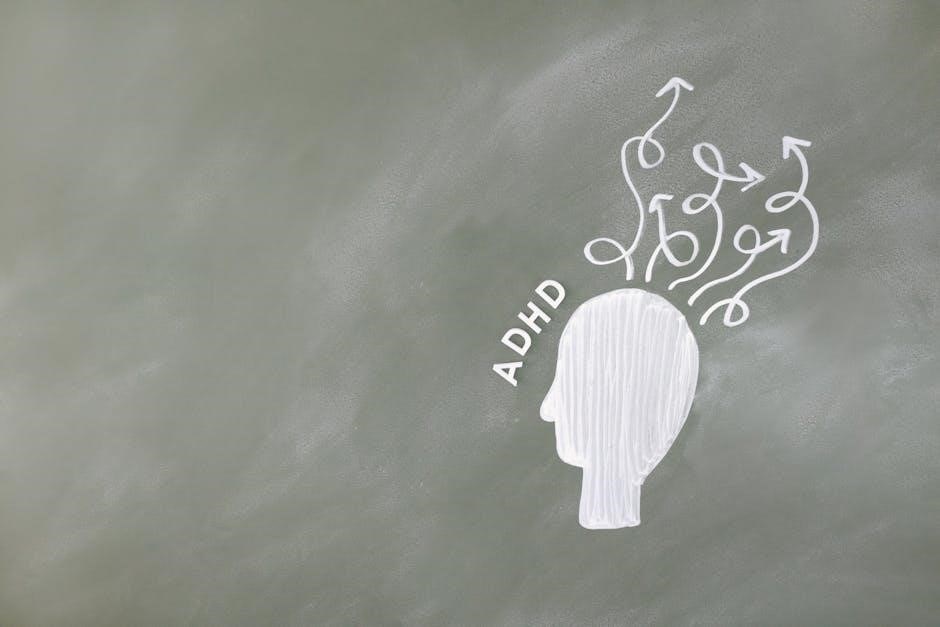Cognitive Psychology: Theory‚ Process‚ and Methodology‚ Third Edition‚ explores mental processes like perception‚ memory‚ and problem-solving. This textbook connects cognitive science to real-life experiences‚ offering insights into human cognition through innovative methods and interdisciplinary approaches‚ including neuroscience.
1.1 Overview of Cognitive Psychology: Theory‚ Process‚ and Methodology
Cognitive Psychology: Theory‚ Process‚ and Methodology‚ Third Edition‚ provides a comprehensive overview of mental processes‚ including perception‚ memory‚ and problem-solving. It integrates theoretical frameworks with empirical methods‚ such as brain imaging‚ to explore cognition. The text emphasizes real-world applications‚ connecting cognitive science to everyday experiences. By focusing on innovative research and interdisciplinary approaches‚ this edition offers a detailed understanding of human cognition and its underlying mechanisms‚ making it a valuable resource for students and researchers alike.
1.2 Key Topics in Cognitive Psychology
Cognitive Psychology: Theory‚ Process‚ and Methodology‚ Third Edition‚ delves into core areas such as perception‚ memory‚ attention‚ language‚ problem-solving‚ and decision-making. These topics form the foundation of understanding mental processes and cognition. The text explores how individuals process information‚ from sensory input to complex cognitive functions. By examining these key areas‚ the book provides a thorough understanding of human cognition‚ emphasizing both theoretical and practical aspects to illuminate how we think‚ learn‚ and interact with the world.
Theoretical Foundations of Cognitive Psychology
Cognitive psychology’s theoretical foundations include models of mental processes‚ such as information processing and cognitive neuroscience. These frameworks explore how the mind processes information‚ emphasizing cognition’s role in behavior.
2.1 Core Theories and Models in Cognitive Psychology
Cognitive psychology relies on core theories such as the information processing model‚ which likens the mind to a computer‚ and cognitive neuroscience‚ which links mental processes to brain activity. These frameworks explore memory‚ attention‚ and language‚ providing structured approaches to understanding human cognition. The Third Edition highlights these theories‚ offering detailed analyses and real-world applications to engage students in the study of mental processes and their underlying mechanisms.
2.2 Historical Development of Cognitive Psychology
Cognitive psychology emerged as a distinct field in the mid-20th century‚ shifting focus from behaviorism to mental processes. The cognitive revolution‚ influenced by Ulric Neisser’s 1967 book‚ emphasized internal mental states. Early theories‚ like the information processing model‚ laid the groundwork. Advances in neuroscience and technology further expanded the field‚ enabling researchers to study brain activity and cognition. The Third Edition highlights this evolution‚ tracing key milestones and the integration of interdisciplinary approaches that have shaped contemporary cognitive psychology.
Research Methodology in Cognitive Psychology
Cognitive psychology employs diverse methodologies‚ including brain imaging and experimental techniques‚ to study mental processes like perception and memory‚ providing insights into human cognition.
3.1 Experimental Methods in Cognitive Psychology
Experimental methods in cognitive psychology involve controlled laboratory studies and behavioral tasks to measure mental processes. Techniques like brain imaging and computational modeling are widely used. The third edition of Cognitive Psychology: Theory‚ Process‚ and Methodology highlights these methods‚ providing detailed case studies. Researchers employ these approaches to investigate perception‚ memory‚ and decision-making. The textbook emphasizes how experimental designs help uncover the underlying mechanisms of cognition‚ making it a valuable resource for understanding the scientific rigor behind cognitive research.
3.2 Role of Neuroscience in Cognitive Research
Neuroscience plays a pivotal role in cognitive research by linking brain activity to mental processes. Techniques like fMRI and EEG provide insights into neural mechanisms. The third edition of Cognitive Psychology: Theory‚ Process‚ and Methodology emphasizes neuroscience’s contributions‚ integrating findings to explain cognition. This interdisciplinary approach bridges psychology and neurobiology‚ offering a comprehensive understanding of how brain functions underpin perception‚ memory‚ and decision-making. The textbook illustrates how neuroimaging and neurophysiological methods enhance the study of cognitive processes‚ advancing both theory and practical applications.

Cognitive Processes and Mechanisms
Cognitive Psychology: Theory‚ Process‚ and Methodology‚ Third Edition‚ examines core processes like perception‚ memory‚ and attention. It explores how these mechanisms shape human cognition and behavior.
4.1 Perception‚ Memory‚ and Attention
Cognitive Psychology: Theory‚ Process‚ and Methodology‚ Third Edition‚ delves into perception‚ memory‚ and attention as foundational cognitive processes. It explores how perception shapes reality‚ memory stores and retrieves information‚ and attention filters stimuli. The textbook highlights experimental methods‚ such as brain imaging‚ to study these mechanisms. By connecting theory to real-world examples‚ it illustrates how these processes influence daily cognition and behavior‚ offering a comprehensive understanding of mental functioning through empirical research and interdisciplinary insights.
4.2 Language‚ Problem-Solving‚ and Decision-Making
Cognitive Psychology: Theory‚ Process‚ and Methodology‚ Third Edition‚ examines language as a tool for thought and communication‚ influencing behavior and cognition. It explores problem-solving strategies‚ such as heuristic and algorithmic approaches‚ and decision-making models like rational choice theory. The textbook integrates neuroscience methods‚ such as fMRI‚ to study these processes‚ linking theory to practical applications in real-world scenarios‚ and demonstrating how cognitive mechanisms shape everyday thinking and behavior through empirical research and interdisciplinary insights.

The Third Edition: Updates and Enhancements
The Third Edition introduces a new chapter on cognitive development‚ updated research‚ and reorganized core chapters to enhance student engagement and understanding of cognitive psychology.
5.1 New Research and Citations in the Third Edition
The Third Edition incorporates updated research and citations‚ reflecting the latest advancements in cognitive psychology. It includes new studies on perception‚ memory‚ and decision-making‚ offering deeper insights into mental processes. The revised content ensures students engage with cutting-edge theories and methodologies. Citations from recent publications enhance the textbook’s relevance‚ providing a robust foundation for understanding cognitive science. This edition also emphasizes interdisciplinary connections‚ particularly with neuroscience‚ to offer a comprehensive view of the field.
5.2 New Chapter on Cognitive Development
The Third Edition introduces a new chapter on cognitive development‚ tracing cognitive processes from infancy through adulthood. This chapter explores how cognitive abilities evolve‚ including language acquisition‚ memory development‚ and problem-solving skills. It integrates research on neurodevelopmental changes and their impact on cognition. Real-world examples illustrate how understanding cognitive development informs education and interventions. This addition enriches the textbook by linking developmental aspects to broader cognitive psychology theories‚ offering a lifespan perspective on mental processes and their growth.

Practical Applications of Cognitive Psychology
Cognitive psychology’s practical applications transform education‚ neuroscience‚ and daily life by enhancing learning strategies‚ improving decision-making‚ and addressing cognitive deficits through evidence-based interventions.
6.1 Real-World Applications in Psychology and Neuroscience
Cognitive psychology’s methodologies‚ such as brain imaging and experimental techniques‚ are integral to neuroscience‚ aiding in the development of treatments for cognitive deficits. Understanding memory and attention enhances educational strategies and workplace performance. These insights are applied in clinical settings to improve mental health interventions‚ demonstrating the practical impact of cognitive psychology on daily life and neuroscience advancements.
6.2 Implications for Education and Daily Life
Cognitive psychology offers practical insights for enhancing learning strategies and memory techniques‚ benefiting educational settings. Its principles improve decision-making and problem-solving skills‚ applicable in everyday life. Understanding attention and cognitive biases helps individuals optimize their routines and interactions‚ demonstrating how cognitive psychology directly impacts personal and professional effectiveness‚ making it a valuable tool for improving overall quality of life.

Future Directions in Cognitive Psychology
Advancements in neuroscience‚ AI‚ and interdisciplinary research are reshaping cognitive psychology. Emerging technologies and collaborative efforts promise new insights into cognition‚ enhancing theoretical and practical applications.
7.1 Emerging Trends and Technologies
Emerging trends in cognitive psychology include advancements in neuroscience‚ AI‚ and neuroimaging technologies. These tools enable deeper insights into cognitive processes‚ enhancing research methodologies. The integration of computational modeling and big data analytics is revolutionizing how cognitive psychologists study mental processes. Additionally‚ wearable devices and virtual reality are providing new avenues for experimental research. These innovations are reshaping the field‚ offering more precise measurements of cognition and emotion. Such advancements are reflected in the third edition‚ highlighting the dynamic evolution of cognitive psychology and its practical applications.
7.2 Interdisciplinary Collaborations and Innovations
Interdisciplinary collaborations are driving innovations in cognitive psychology‚ blending insights from neuroscience‚ education‚ and computer science. The integration of cognitive psychology with AI and data science is fostering new research tools. Collaborations with education experts are enhancing learning strategies‚ while partnerships in healthcare are improving cognitive rehabilitation methods. These interdisciplinary efforts‚ highlighted in the third edition‚ are expanding the field’s impact‚ offering practical solutions across diverse domains and advancing our understanding of mental processes through collaborative innovation.



